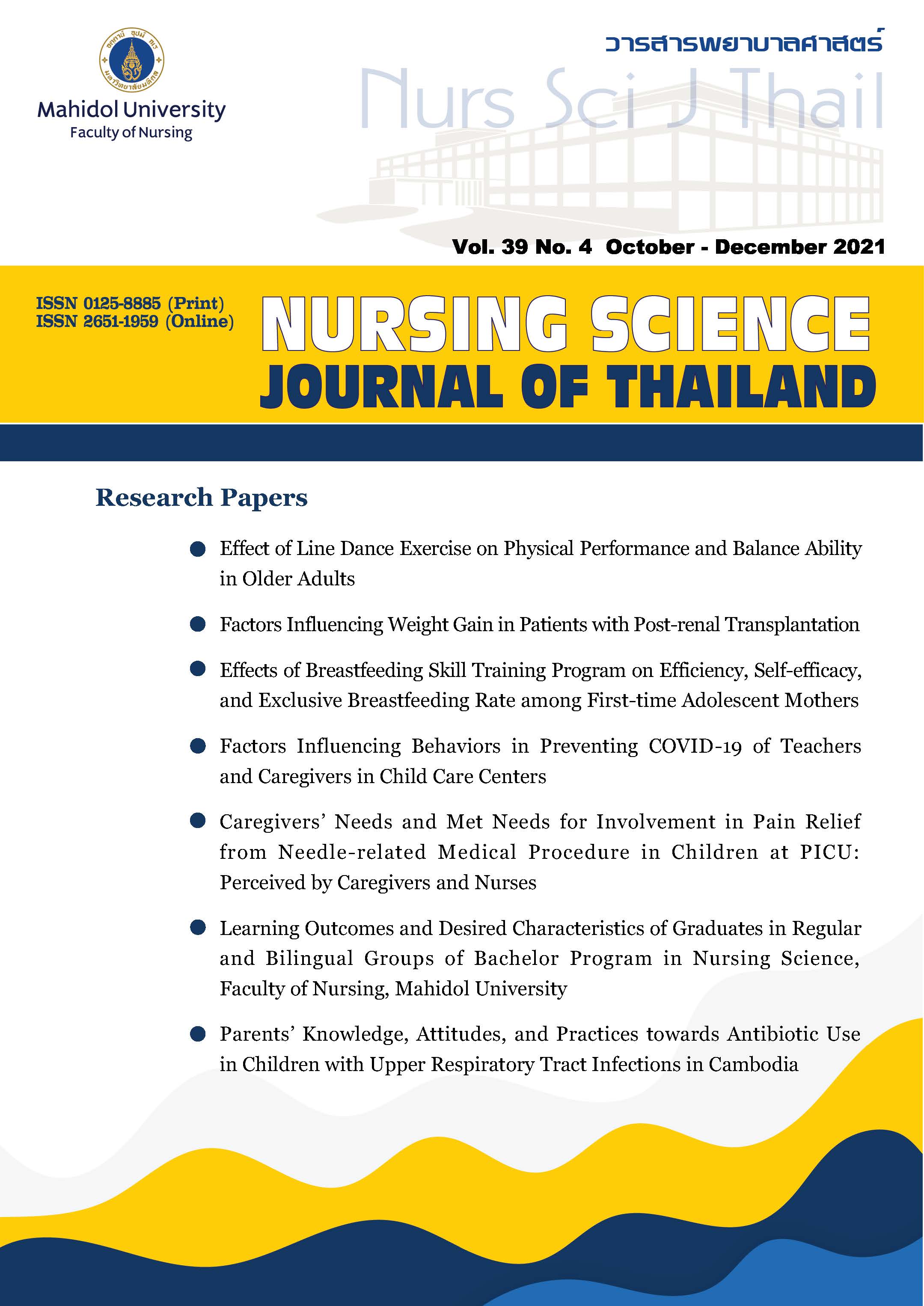Effects of Breastfeeding Skill Training Program on Efficiency, Self-efficacy, and Exclusive Breastfeeding Rate among First-time Adolescent Mothers
Main Article Content
Abstract
Purpose: To examine the effects of the breastfeeding skill training program on breastfeeding efficiency at discharge and 1-month exclusive breastfeeding rate among first-time adolescent mothers.
Design: Quasi-experimental study with pre-test post-test control group design.
Methods: Through convenience sampling, the sample consisted of 50 mothers with normal delivery aged 15-19 years at the postpartum ward of Chiangrai Prachanukroh Hospital. They were divided into control and experimental groups with 25 each. The control group received only routine nursing care, while the other received both routine nursing care and the breastfeeding skill training program including observation, practice and self-assessment. Data were collected using a demographic characteristic questionnaire, breastfeeding self-efficacy scale short form, efficient breastfeeding and sucking assessment form, and exclusive breastfeeding record form. Data were analyzed using descriptive statistics, Independent t-test, Mann-Whitney U test, Chi-square test, Fisher exact test and Z test.
Main findings: The study revealed that mothers in the experimental group had significantly higher efficient breastfeeding score at discharge and breastfeeding self-efficacy score at 1 month than that in the control group (Z = 5.36, p < .001 and Z = 5.13, p < .001, respectively). Rate of 1-month exclusive breastfeeding was also significantly higher than that in the control group (p < .05).
Conclusion and recommendations: Breastfeeding skill training program can increase efficient breastfeeding at discharge and maternal self-efficacy in breastfeeding at 1 month after giving birth, and the rate of exclusive breastfeeding at 1 month. Therefore, nurses and midwives should apply the breastfeeding skill training program to promote postpartum adolescent mothers for continuing efficient exclusive breastfeeding.
Article Details
Copyright Notice: Nursing Science Journal of Thailand has exclusive rights to publish and distribute the manuscript and all contents therein. Without the journal’s permission, the dissemination of the manuscript in another journal or online, and the reproduction of the manuscript for non-educational purpose are prohibited.

Disclaimer: The opinion expressed and figures provided in this journal, NSJT, are the sole responsibility of the authors. The editorial board bears no responsibility in this regard.
References
Giugliani ER, Horta BL, Loret de Mola C, Lisboa BO, Victora CG. Effect of breastfeeding promotion interventions on child growth: a systematic review and meta-analysis. Acta Paediatr. 2015;104(467):20-9. doi: 10.1111/apa.13160.
Kramer MS, Kakuma R. Optimal duration of exclusive breastfeeding. Cochrane Database Syst Rev. 2012;2012(8):CD03517. doi: 10.1002/14651858.CD003517.pub2.
Deoni SC, Dean DC 3rd, Piryatinsky I, O'Muircheartaigh J, Waskiewicz N, Lehman K, et al. Breastfeeding and early white matter development: a cross-sectional study. Neuroimage. 2013;82(1):77-86. doi: 10.1016/j.neuroimage.2013.05.090.
Haroon S, Das JK, Salam RA, Imdad A, Bhutta ZA. Breastfeeding promotion interventions and breastfeeding practices: a systematic review. BMC Public Health. 2013;13 Suppl 3:S20. doi: 10.1186/1471-2458-13-S3-S20.
Stuebe AM, Schwarz EB. The risks and benefits of infant feeding practices for women and their children. J Perinatol. 2010;30(3):155-62. doi: 10.1038/jp.2009.107.
Brodribb WE. Breastfeeding--a framework for educating the primary care medical workforce. Breastfeed Rev. 2012;20(2):25-30.
Nesbitt SA, Campbell KA, Jack SM, Robinson H, Piehl K, Bogdan JC. Canadian adolescent mothers’ perceptions of influences on breastfeeding decisions: a qualitative descriptive study. BMC Pregnancy Childbirth. 2012;12:149. doi: 10.1186/1471-2393-12-149.
Feenstra MM, Jorgine KM, Thygesen M, Danbjorg DB, Kronborg H. Early breastfeeding problems: a mixed method study of mothers' experiences. Sex Reprod Healthc. 2018;16:167-74. doi: 10.1016/j.srhc.2018.04.003.
The Thailand National Statistical Office, National Health Security Office, UNICEF Thailand. Thailand: multiple indicator cluster survey 2015-2016 [Internet]. Bangkok: UNICEF Thailand; 2016 [cited 2020 Dec 24]. Available from: https://www.unicef.org/thailand/media/176/file/Key%20Findings%20from%20Thailand%20Multiple%20Indicator%20Cluster%20Survey%202015-2016%20(English).pdf.
Nuampa S, Tilokskulchai F, Sinsuksai N, Phahuwatanakorn W. Breastfeeding experiences among Thai adolescent mothers: a descriptive qualitative study. Pac Rim Int J Nurs Res Thail. 2018;22(4):288-303.
Hermin M, Toth M. Inspiring active learning: a complete handbook for today’s teacher. Alexandria, VA: Association for Supervision & Curriculum Development; 2006. 475 p.
Puapornpong P, Raungrongmorakot K, Manolerdtewan W, Ketsuwan S, Wongin S. Teenage pregnancy and exclusive breastfeeding rates. J Med Assoc Thai. 2014;97(9):893-8.
Parashar M, Singh S, Kishore J, Patavegar BN. Breastfeeding attachment and positioning technique, practices and knowledge of related issues among mothers in colony of resettlement Delhi. Infant Child Adolesc Nutr. 2015;7(6):317-22. doi: 10.1177/1941406415602528.
Bandura A. Social foundation of thought and action: a social cognitive theory. Englewood Cliffs, NJ: Printice-Hall; 1986. 617 p.
Cohen J. Statistical power analysis for the behavioral sciences. 2nd ed. Hillsdale, NJ: Lawrence Erlbaum Associates; 1988. 567 p.
Paibunbanphot N, Anusorntheerakun S. Effects of breastfeeding promotion program on knowledge, attitude, and breastfeeding skills among postpartum mothers. Journal of Nursing Science & Health. 2015;38(1):41-52. (in Thai).
World Health Organization. Guideline: counselling of women to improve breastfeeding practices [Internet] Geneva: WHO; 2018. [cited 2020 Sep 20]. Available from: https://www.who.int/nutrition/publications/guidelines/counselling-women-improve-bf-practices/en/
Dennis CL. The breastfeeding self-efficacy scale: psychometric assessment of the short form. J Obstet Gynecol Neonatal Nurs. 2003;32(6):734-44. doi: 10.1177/0884217503258459.
Thussanasupap B. The effect of systematic of breastfeeding self-efficacy, nipple pain, nipple skin change and incision pain of cesarean mother [master’s thesis]. Bangkok: Mahidol University; 2006. 110 p. (in Thai).
Stable D, Rankin J. Physiology in childbearing with anatomy and related biosciences. 3rd ed. London: Bailliere Tindall; 2010. 792 p.
Liu L, Zhu J, Yang J, Wu M, Ye B. The effect of a perinatal breastfeeding support program on breastfeeding outcomes in primiparous mothers. West J Nurs Res. 2017;39(7):906-23. doi: 10.1177/0193945916670645.
Bandura A. Self-efficacy: toward a unifying theory of behavioral change. Psychol Rev. 1977;84(2):191-215. doi: 10.1037//0033-295x.84.2.191.
Polgaya O, Choolert P. The effect of the maternal roles promoting program by family support on attitude and maternal roles among adolescent mothers. Journal of Health Research and Innovation. 2019;2(1):131-42. (in Thai).


